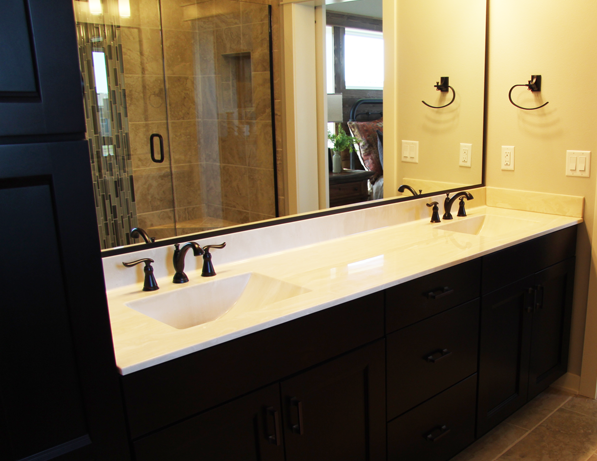 After years of living in a small fixer-upper, you’re finally ready to talk with a custom home builder about constructing the place of your dreams. Part of your vision is a luxurious bathroom in which to relax at the end of long, stressful days. When selecting the perfect vanity top for your custom bathroom, consider how the following options would suit your style preferences and budget.
After years of living in a small fixer-upper, you’re finally ready to talk with a custom home builder about constructing the place of your dreams. Part of your vision is a luxurious bathroom in which to relax at the end of long, stressful days. When selecting the perfect vanity top for your custom bathroom, consider how the following options would suit your style preferences and budget.
Quartz{{cta(‘d4c2c54c-c229-45e9-8249-8a411c626f27′,’justifyright’)}}
Quartz is the most popular vanity top material on the market right now, and for good reason. Manufacturers of quartz countertops add resins, pigments, and sometimes, recycled content to a base that is roughly 95% stone. Tougher than granite, quartz doesn’t need to be sealed. This popular vanity top material is naturally resistant to stains, bacteria, and moisture.
The main drawback of quartz is its price, which rivals that of high-end granite. Textured and honed finishes can also show smudges and fingerprints.
Granite
Granite remains a popular material for bathroom vanity tops. This natural stone is available in a plethora of colors and patterns. Granite is scratch resistant, and it isn’t easily damaged by heat and humidity. Like quartz, granite is priced in the higher ranges. To keep granite countertops looking like new, you must seal them regularly.
Solid Surface
Solid surface countertops are constructed from crushed stone and acrylic resin. Like quartz, solid surface vanity tops are resistant to stains, bacteria, and water. Certain styles mimic the look of natural stone. If your solid surface countertops sustain minor damage, you can typically buff it out. These durable vanity tops are also virtually seamless. Unfortunately, you can damage your solid surface countertops if you drop objects on them or subject them to extreme heat.
Marble
Marble looks classically elegant. This luxurious stone has been used by homeowners for centuries. Marble countertops can complement almost any type of home, and they’re aretough enough to resist most chips and dents. Because marble is a natural stone, it is costly. The porous characteristics of marble make it susceptible to stains, scratches, and etching from acidic substances. Like granite, marble vanity tops must be sealed periodically.
Concrete
If you’re in love with modern or industrial designs, concrete vanity tops might be your best option. These versatile countertops are available in numerous colors and textures. Unbelievably durable, concrete vanity tops are also environmentally friendly. Concrete countertops are porous, so you’ll need to both wax and seal them regularly. Also be aware that concrete countertops contain visible seam lines.
Tile
Tile countertops are a popular choice in Spanish- or coastal-inspired homes. Tile vanity tops can be easily customized. They’re an affordable alternative to natural or engineered stone, and you can replace individual tiles if they become chipped or cracked. Glazed ceramic tiles are resistant to heat, staining, scratches, and water. The biggest downside of tile countertop is its propensity for grout to attract mildew and stains.
Laminate
Laminate countertops are constructed from a thin plastic surface that is pressure bonded to either a plywood or a particle board base. This kind of vanity top is known for its affordability. Laminate countertops are durable and easy to clean. However, they tend to become dull or thin over time. If your laminate countertops are damaged, they can’t be repaired; you’ll need to replace the entire piece.
Selecting vanity tops for your bathrooms can be an exciting step in the custom home building process. Before shopping for bathroom countertops, carefully study your options. If you want more information or would like to schedule a consultation for your Des Moines-area custom home project, contact Homes by Brill today!
{{cta(‘1e93aa8a-3903-49f0-93b7-7971f4bd2a8f’,’justifycenter’)}}
